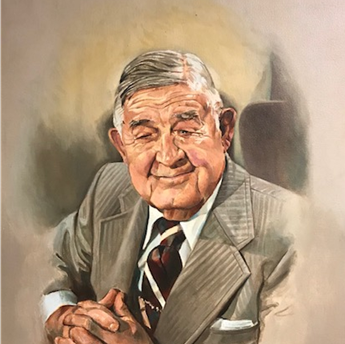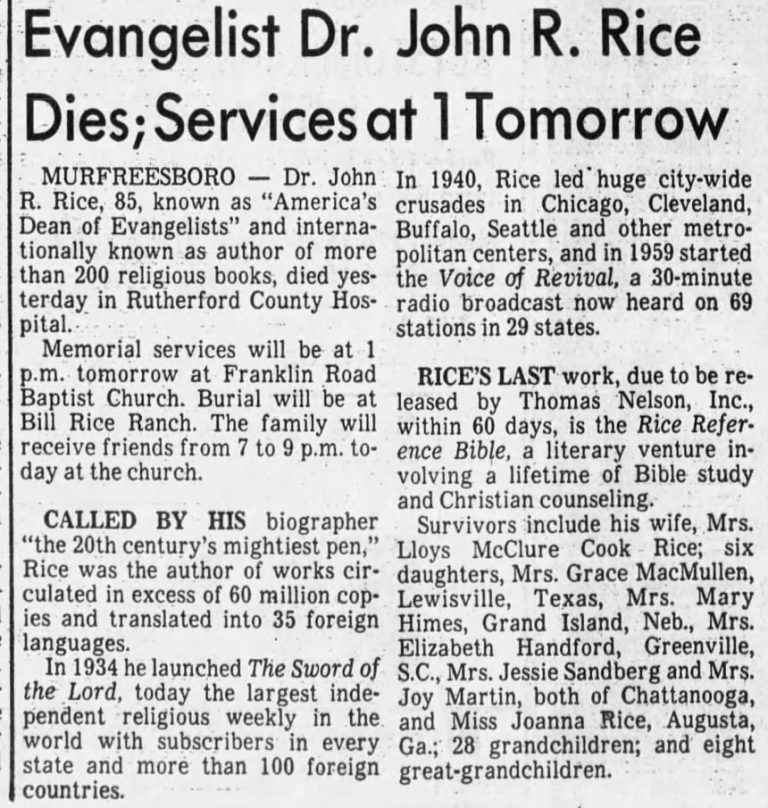John Richard Rice
“The world never burned a casual Christian at the stake.”
(John Richard Rice)
Early Life and Call to Ministry
John Richard Rice was born on December 11, 1895, in Cooke County, Texas, the eldest son of William H. Rice and Sallie Elizabeth La Prade Rice. At age twelve he made a profession of faith and joined his parents’ church. After high school he taught in a rural school, and then—despite limited means—he pursued higher education: Rice attended Decatur Baptist College in Texas (riding 120 miles on his pony to get there), graduated from Baylor University in 1920, and did graduate work at Southwestern Baptist Theological Seminary and the University of Chicago.
In his early twenties, he sensed a call to full-time gospel work. While studying at the University of Chicago, an encounter with modernist theology shook him: he later recalled hearing William Jennings Bryan and witnessing the tragic drift of a missionary’s son into infidelity. He said he felt burdened to contend for the faith of his fathers.
Evangelistic Ministry and Pastoral Work
Rice began ministry as a pastor, serving churches in Texas: in Plainview (assistant), Shamrock (senior pastor), and then in Dallas at the Oak Cliff Fundamentalist Baptist Tabernacle. It was during his Dallas pastorate that in 1934 he founded his publication, The Sword of the Lord—initially a small bi-weekly church publication, but it rapidly grew in influence. In 1940 Rice resigned his pastorate to devote himself to full-time evangelism, relocating the Sword operations to Wheaton, Illinois, then later to Murfreesboro, Tennessee.
His evangelistic campaigns were widescale: he held city-wide revivals and crusades in Chicago, Cleveland, Buffalo, Seattle, and many other metropolitan areas. welovegod.org These meetings bore thousands of professions of faith and contributed significantly to mid-20th-century evangelical momentum.
Publishing and Media Influence
Arguably Rice’s most lasting legacy lies in his publishing and media work. The Sword of the Lord magazine under his leadership became one of the most influential independent Baptist periodicals of the 20th century. By the early 1950s the circulation had grown from 5,000 copies at its inception to well over 90,000.
Rice also authored more than 200 books and booklets, with cumulative circulation exceeding 60 million copies before his death. His tract “What Must I Do to Be Saved?” alone was distributed some 32 million times in English, plus millions more in other languages. welovegod.org In 1959, he launched the radio program Voice of Revival which aired on 69 stations in 29 states, Puerto Rico and the Philippines.
Theological Convictions and Movement Leadership
Rice’s theological stance was decisively fundamentalist. He opposed modernist theology, evolutionary teaching, humanistic philosophy, and any perceived drift from the authority of Scripture. Simultaneously, he placed deep emphasis on evangelism and soul-winning: his whole ministry was anchored in the belief that the primary task of the church and preacher is to reach the lost.
Rice also helped organize and lead evangelism conferences (later referred to as “Sword Conferences”) drawing hundreds of pastors and evangelists. His publications and conferences helped give structure and cohesion to the independent-Baptist fundamentalist movement in America.
Legacy and Continuing Impact
John R. Rice died December 29, 1980, in Murfreesboro, Tennessee. Even in death, his influence continues to be felt:
- Publishing infrastructure: The Sword of the Lord continues to be published, carried on by his successors, and remains a voice within fundamentalist-independent Baptist circles.
- Evangelistic model: Rice’s commitment to large-scale campaigns, tract literature, radio and sustained publishing help define what 20th-century mass evangelism looked like. Many evangelists and pastors credit Rice’s example.
- Doctrine and ecclesiology: His insistence on biblical inerrancy, opposition to liberalism, and championing of separationist principles helped shape the identity of many independent Baptist churches.
- Educational influence: Though Rice was not primarily an educator in a seminary sense, his writings, tracts, and publications provided training and resource material for countless pastors and evangelists.
- Soul-winning emphasis: The sheer volume of decisions claimed in his campaigns, and the broad circulation of his Gospel tracts underscore a ministry defined by urgency and outreach.
Strengths and Controversies
Rice’s life is marked by both commendable achievements and significant controversies. On the positive side, his industriousness, writing proficiency, evangelistic zeal and institutional vision set him apart—some biographers dubbed him “the twentieth century’s mightiest pen.”
Yet he also held strong separationist views and was deeply critical of other evangelicals whom he believed compromised on doctrine. His style could be polemical, and his movement’s stance toward culture and issue areas drew criticism for being overly rigid or sectarian.
Moreover, his earlier affiliation with independent fundamentalism separated from the Southern Baptist Convention in 1927 reflected his willingness to eschew denominational structures over theological convictions.
Practical Lessons from His Life
From Rice’s ministry, several practical insights emerge for pastors, evangelists, and ministry leaders:
- Consistency over novelty – Rice’s long-term commitment to the written word, radio, tracts and evangelism shows that sustained effort often outweighs flash in ministry.
- The power of communication – Whether writing 200 books or circulating millions of tracts, his emphasis on effective communication underscores the role of media in outreach.
- Evangelism as central – Rice’s ladder of priorities placed winning souls and preaching headline. Minor is the pastor-teacher who forgets the lost.
- Institution-building with purpose – He built publishing and conference arms not for their own sake, but to multiply ministry.
- Doctrinal clarity matters – Rice believed that theology shapes practice; his emphasis on scriptural authority undergirded his evangelistic urgency and movement leadership.
Conclusion
John Richard Rice stands as a pivotal figure in 20th-century American evangelicalism—not only as an evangelist who preached to thousands and authored hundreds of books, but as a publisher, institution-builder and theological voice. His life story—from Texas ranching roots to nationwide evangelistic prominence—reveals the influence possible when conviction meets consistency.
His legacy is not simply a list of accomplishments, but a framework: a ministry that held fast to Scripture, multiplied through writing and media, and kept the gospel as the central message. While his methods and affiliations invite critique and reflection, the fundamental impulse of his life—reaching the lost, equipping the church, and proclaiming the Word—remains relevant.
For those studying evangelical history, fundamentalism’s past, or the development of independent Baptist identity in America, John R. Rice remains a reference point: a man who believed the Word mattered, souls mattered, and the church had a mission. His influence carried forward through print, pulpits and personal witness—and continues to influence the shape of evangelical outreach today.
_____
Image Source/Credit (in order):
- Admin. “John Richard Rice.” Christian Hall of Fame, 26 Aug. 2020, christianhof.org/rice.
- Newspapers.com, The Tennessean, December 30, 1980, https://www.newspapers.com/article/the-tennessean/191093142/
Related
Sorry, no records were found. Please adjust your search criteria and try again.
Sorry, unable to load the Maps API.

